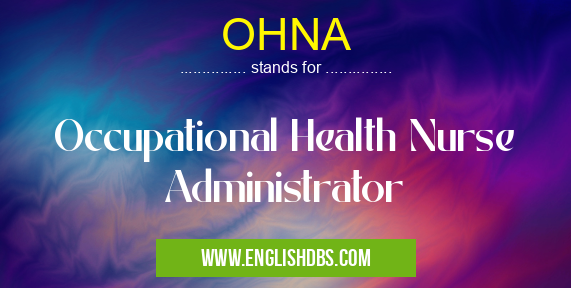What does OHNA mean in HEALTHCARE
An Occupational Health Nurse Administrator (OHNA) is a health professional who oversees the management and delivery of occupational health services within an organization. OHNAs work to ensure that employees' physical, mental and emotional wellbeing are taken into account in an effort to maximize their job performance and productivity. OHNAs also consult with employers on ways to reduce workplace risks and provide advice on creating safe working environments for all staff members. By monitoring safety protocols, looking out for signs of illness or injury, and providing supportive care programs, OHNAs help workplaces maintain healthy operations

OHNA meaning in Healthcare in Medical
OHNA mostly used in an acronym Healthcare in Category Medical that means Occupational Health Nurse Administrator
Shorthand: OHNA,
Full Form: Occupational Health Nurse Administrator
For more information of "Occupational Health Nurse Administrator", see the section below.
» Medical » Healthcare
Essential Questions and Answers on Occupational Health Nurse Administrator in "MEDICAL»HEALTHCARE"
What is an Occupational Health Nurse Administrator?
An Occupational Health Nurse Administrator is an individual responsible for administering occupational health care services in the workplace. These activities include identifying, addressing, and controlling health risks inherent to a job or specific work environment through assessment of policies, procedures and practices. An OHNA also provides support to employers in navigating legislative requirements related to occupationally-related health and safety standards.
What are the responsibilities of an Occupational Health Nurse Administrator?
The primary responsibility of an OHNA is to identify and assess potential risks related to working conditions within a job setting. This includes ensuring that all existing safety protocols are being followed, updating policies as needed, as well as providing proactive solutions for issues that may arise during the course of employment. Furthermore, they offer clinical support through providing education on healthy lifestyles and best practices for managing long term conditions in employees.
How does an Occupational Health Nurse Administrator ensure workplace safety?
An OHNA will ensure workplace safety by conducting regular assessments of the workspace to identify potential hazards such as inadequate ventilation or environmental pollution. They will also develop strategies for reducing risk and implementing preventative measures where necessary. In addition, they will provide training to staff on how to respond safely and effectively in the event of any emergency situation within their working environment.
What qualifications should an individual possess if they want to become an Occupational Health Nurse Administrator?
To become an OHNA, individuals should have at least one year’s experience in nursing – preferably in occupational health – along with qualifications such as a BSc or MSc in Nursing or Occupational Medicine and/or regulatory bodies such as NMC Professional Registration (UK) or American Board Certification (USA). Certain countries may require certification from their national professional body.
What kind of challenges can an Occupational Health Nurse Administrator face on a daily basis?
Due to the complex nature of occupational hazards, OHSAs face numerous different daily challenges ranging from balancing demands from multiple stakeholders while maintaining compliance with legislation while keeping costs down; advocating for worker well-being; addressing both physical and psychological injuries; handling medical emergencies; diagnosing illnesses; monitoring workplace environments; educating employers on health regulations; responding quickly to employee concerns; providing support during investigations into incidents or accidents; and developing processes that produce positive outcomes across all areas affected by occupational health issues.
How does an Occupational Health Nurse Administrator help employers comply with legislative requirements?
OHSAs plays a key role in helping employers meet their legal obligations under various legislative frameworks which cover areas such as manual handling, noise exposure levels, hazardous substances storage etc. By conducting assessments regarding current practices within the workplace alongside audits comparing these against applicable laws they can detect any discrepancies allowing employers time to rectify issues before facing financial penalties or other sanctions if found guilty of not meeting their obligations.
What skills do most successful Occupational Health Nurse Administrators possess?
Successful OHSAs must be highly organized individuals who possess excellent communication skills both verbal & written); strong problem-solving abilities; good understanding of company laws & regulations related to safety & health; efficient multitasking capabilities; critical thinking capabilities when dealing with unexpected incidents or cases requiring urgent attention; empathy towards workers’ situations combined with resilience when making unpopular decisions and more importantly strong interpersonal & influencing skills are essential competencies required for success.
